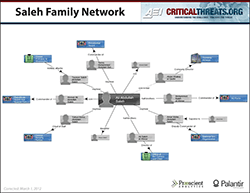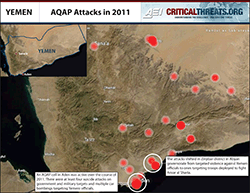 |
Today’s one-candidate presidential election in Yemen will formally transition power from President Ali Abdullah Saleh to now-Vice President Abdul Rab Mansour al Hadi. There has been strong turnout to vote, particularly in Sana’a; however, turnout in predominately anti-government regions has been poor. The boycott of the election by established opposition groups demonstrates their continued rejection of the Sana’a-based government. The U.S. approach to Yemen has been to facilitate the stabilization of a government that will continue cooperating on counter-terrorism issues, but it is unlikely that a new government will prioritize the fight against al Qaeda over more direct threats to its existence.
U.S. Deputy National Security Advisor John Brennan stated that the U.S. will not re-evaluate its “program of support to the Yemeni government.” Instead, Brennan stated, the U.S. will “continue to press the Yemeni government, the Yemeni intelligence, security and military services, to do the right thing against al-Qaeda.” Brennan emphasized that there is a need for Yemen to professionalize its military and armed forces in order to successfully destroy al Qaeda. He further added that the U.S. has underscored that it will provide assistance to those units “that are actually going to be engaged in the fight against al-Qaeda.”
Southern secessionists have attacked polling stations in Aden, Hadramawt, and Lahij governorates. At least four people were killed in Tuesday’s spate of election-linked violence. A series of attacks Monday on polling stations targeted sites in Aden, Dhaleh, and Shabwah. Yemen’s Southern Movement has called for a general boycott of the presidential election, saying that it would legitimize the northern government.
The U.S. ambassador to Yemen stated that Iran has become more active in Yemen. Ambassador Gerald Feierstein said, “We do definitely see a rise in Iranian finance, efforts on the part of Iran to increase its influence not only with Zaydi Shia elements but with Sunni elements as well…. We do think that we have evidence of Iranian activities that will build up military capabilities as well. It's a relatively recent phenomenon, Iran is taking advantage of this period of political instability and loss of government control over large parts of the country.” The al Houthis have carved off a state-within-a state in north Yemen and have been attempting to expand their territorial control. Like the Southern Movement, the al Houthis have called for a boycott of the election.
 |
Al Qaeda in the Arabian Peninsula released a eulogy for Tareq al Dhahab, the local AQAP leader who seized control of Rada’a in mid-January. Dhahab’s half-brother killed him in a mosque for his allegiance to AQAP; Dhahab’s followers then killed his half-brother. Separately, Ansar al Sharia, AQAP’s insurgent arm, issued a news report on AQAP’s activities in which it highlighted that AQAP militants killed an al Houthi commander in Ma’rib and killed four other al Houthis in Sa’ada with a roadside bomb. (Post obtained and translated by SITE.)
← Previous |
Next → |
